

In 2002, Dubai’s government allowed foreigners to own the property outright, significantly boosting its real estate market. Since then, Dubai has become a popular place for global investment, offering a variety of properties, good returns on investment, and a well-regulated market. This has consistently attracted foreign buyers, including expats living in Dubai and those living abroad.
This blog will cover what non-resident investors need to know to buy property in Dubai, including the specific areas where foreign ownership is allowed and the advantages of investing in Dubai’s real estate market.
Many people wonder if foreigners can buy property in Dubai and whether it’s a good long-term investment. The answer is yes. Foreign nationals, including expats living in Dubai and non-resident investors, can own property on a freehold basis. This means they have the right to buy, sell, or lease their property. However, there’s a catch: they can only buy property in certain areas designated as freehold zones by the Dubai government.
Dubai’s real estate market is accessible to investors from abroad, meaning you don’t need a local residence visa to buy a property here. However, you must have a valid passport to confirm your identity during the purchase. Foreign buyers can also apply for a mortgage with banks in the UAE, but their options might be more limited compared to local residents and citizens. The criteria for getting a mortgage as a non-resident in Dubai differ among banks and may depend on your home country, income, and other factors. To apply for a mortgage in Dubai, non-residents will need to provide financial statements and proof of employment.
In Dubai, foreigners and expats can buy property in specific zones known as freehold areas. They can own property outright, have usufruct rights (the right to use and benefit from the property), or leasehold rights for up to 99 years.
Article 3 of the 2006 Regulation, which identifies the plots of land that can be owned by non-nationals in Dubai, can be found on pages 129-132 of the regulation document. The Dubai Land Department issues the title deeds for properties, and there is no age restriction for owning property in Dubai.
For more details on property ownership and leasing, refer to the Dubai Real Estate Legislation.
Overseas investors often ask, “Where can foreigners buy property in Dubai?” Foreign nationals can purchase properties in certain areas known as freehold zones. These zones are highly desirable locations in Dubai, offering a range of property types.
According to the Dubai Sales Market Report for the first half of 2023, the top areas for property investments are Dubai Marina, Jumeirah Village Circle (JVC), Downtown Dubai, Business Bay, and DAMAC Hills 2. These freehold areas allow foreign buyers and offer both affordable and luxury real estate options.
Foreign investors in Dubai can choose from a variety of residential properties, such as apartments, duplexes, lofts, hotel apartments, villas, and townhouses. For those interested in commercial real estate, there are options like offices, shops, and showrooms in freehold areas.
When you’re looking to buy property in the UAE, the documents you’ll need can vary based on where you’re buying and your specific situation. Here’s a checklist for expats buying in Dubai:
If you’re getting a mortgage, the bank will want to approve your purchase agreement beforehand. The Dubai Land Department will also need to give the thumbs up for your mortgage before you can get the NOC.
Once you’ve completed all the legal steps, you’ll receive the property title deed, making you the official owner of the property in Dubai.
In conclusion, Dubai presents a golden opportunity for foreign investors and expats looking to purchase property. With its well-defined freehold areas, a wide array of property types, and a clear, streamlined process for ownership, Dubai stands out as a welcoming and lucrative market for international real estate investment. The documentation required is straightforward, ensuring that if you have your financials in order and comply with the necessary legalities, owning a piece of Dubai’s dynamic landscape is within reach.